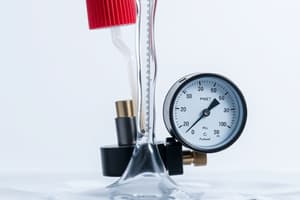Podcast
Questions and Answers
What is the primary purpose of hydraulic jacks?
What is the primary purpose of hydraulic jacks?
- To automate industrial processes.
- To control fluid flow in pipelines.
- To generate electricity from water.
- To lift heavy objects using hydraulic pressure. (correct)
Which property of hydraulic fluid is essential for system efficiency?
Which property of hydraulic fluid is essential for system efficiency?
- Color.
- Odor.
- Density.
- Viscosity. (correct)
What components are critical for the operation of hydraulic systems?
What components are critical for the operation of hydraulic systems?
- Only pipes and valves.
- Electric motors and batteries.
- Pumps, pipes, valves, and actuators. (correct)
- Compressors and condensers.
What role do valves play in hydraulic systems?
What role do valves play in hydraulic systems?
How do hydraulic machines relate to fluid mechanics?
How do hydraulic machines relate to fluid mechanics?
In what industrial applications are hydraulic actuators primarily used?
In what industrial applications are hydraulic actuators primarily used?
What is a consequence of improper hydraulic fluid selection?
What is a consequence of improper hydraulic fluid selection?
How are hydraulic pumps and turbines classified?
How are hydraulic pumps and turbines classified?
What is specific gravity?
What is specific gravity?
Which principle states that an increase in fluid speed occurs with a decrease in static pressure?
Which principle states that an increase in fluid speed occurs with a decrease in static pressure?
Which of the following describes laminar flow?
Which of the following describes laminar flow?
What do hydraulic actuators primarily convert?
What do hydraulic actuators primarily convert?
Which type of hydraulic machine is used to lift fluids?
Which type of hydraulic machine is used to lift fluids?
What is viscosity a measure of?
What is viscosity a measure of?
Which of the following classes of turbines is commonly used in power plants?
Which of the following classes of turbines is commonly used in power plants?
What does the continuity equation state about fluid flow?
What does the continuity equation state about fluid flow?
Flashcards
Density of a Fluid
Density of a Fluid
The mass per unit volume of a fluid.
Specific Gravity
Specific Gravity
The ratio of a substance's density to the density of water at a standard temperature.
Pressure
Pressure
The force exerted by a fluid per unit area.
Viscosity
Viscosity
Signup and view all the flashcards
Buoyancy
Buoyancy
Signup and view all the flashcards
Continuity Equation
Continuity Equation
Signup and view all the flashcards
Bernoulli's Principle
Bernoulli's Principle
Signup and view all the flashcards
Laminar Flow
Laminar Flow
Signup and view all the flashcards
Hydraulic Fluid
Hydraulic Fluid
Signup and view all the flashcards
Hydraulic System
Hydraulic System
Signup and view all the flashcards
Pressure and Flow Control Valves
Pressure and Flow Control Valves
Signup and view all the flashcards
Hydraulic Jack
Hydraulic Jack
Signup and view all the flashcards
Hydraulic Pressure
Hydraulic Pressure
Signup and view all the flashcards
Fluid Mechanics and Hydraulic Machines
Fluid Mechanics and Hydraulic Machines
Signup and view all the flashcards
Hydropower Turbine
Hydropower Turbine
Signup and view all the flashcards
Study Notes
Fluid Mechanics
-
Fluid mechanics is the branch of physics that studies the behavior of fluids (liquids and gases) and the forces acting on them.
-
Key principles include:
- Density: Mass per unit volume (ρ).
- Specific gravity: Ratio of a substance's density to the density of water at a standard temperature.
- Pressure: Force per unit area exerted by a fluid.
- Viscosity: A measure of a fluid's resistance to flow. Higher viscosity means greater resistance.
- Surface tension: The tendency of liquid surfaces to minimize their area.
- Buoyancy: The upward force exerted by a fluid that opposes the weight of an immersed object.
- Continuity equation: The principle that in a steady flow, the mass flow rate of a fluid is constant at any point along the streamline.
- Bernoulli's principle: States that an increase in the speed of a fluid occurs simultaneously with a decrease in static pressure or a decrease in the fluid's potential energy.
- Navier-Stokes equations: Partial differential equations that govern the motion of viscous fluids. Frequently used in computational fluid dynamics (CFD).
-
Types of flows:
- Laminar flow: Smooth, orderly flow of fluid particles in parallel layers.
- Turbulent flow: Chaotic and erratic flow with mixing of fluid particles.
Hydraulic Machines
-
Hydraulic machines use the principles of fluid mechanics to transfer and utilize energy.
-
Common types of hydraulic machines include:
- Pumps: Convert mechanical energy to hydraulic energy by increasing the pressure of a fluid. Used to lift water or move fluids from one place to another. Pumps can be categorized further based on their operating mechanism, like centrifugal, reciprocating, or axial flow pumps.
- Turbines: Convert hydraulic energy to mechanical energy by using the kinetic energy of moving water to spin a rotor. Turbines are used to generate electricity in power plants. There are various types, categorized in terms of their application e.g. Francis, Kaplan and Pelton turbines.
- Hydraulic actuators: Convert hydraulic energy to linear or rotary motion for various industrial and automotive applications. These machines use hydraulic pressure to cause linear displacement of a piston or rotational movement of a shaft.
- Hydraulic presses: Use hydraulic pressure to exert large forces for tasks such as lifting heavy objects or shaping metal.
- Hydraulic jacks: Use hydraulic pressure to lift heavy objects, like cars or trucks.
-
Key aspects in hydraulic machines:
- Hydraulic fluid: Essential for transmitting pressure and force through the system. Key properties include viscosity, pressure resistance, and stability at expected temperatures.
- Hydraulic systems: Composed of pumps, pipes, valves, and actuators arranged to perform a specified task. Proper design and maintenance are critical for efficient and safe operation. System efficiency is heavily reliant on the type of fluid used and the associated friction forces within the system.
- Pressure and flow control: Controlled by valves which allow flow regulation and prevent damage from unexpected pressure surges. Using controls effectively optimizes the response of the system.
-
Applications of hydraulic machines:
- Hydropower generation: Turbines are used to generate electricity from flowing water.
- Industrial automation: Hydraulic actuators are used in various manufacturing and industrial processes in a wide range of applications including construction and mining.
- Automotive: Hydraulic systems are used in braking systems, suspension, and power steering.
-
Hydraulic pumps and turbines classifications: Classifications can be based on different criteria, e.g., whether their flow is axial, radial, or diagonal. Also, based on their function, like providing lift or pressure or power. This depends on the specific machine.
Fluid Mechanics and Hydraulic Machines Interrelation
- The design and operation of hydraulic machines are directly dependent on the principles of fluid mechanics.
- Understanding fluid properties and behaviors (viscosity, pressure, flow rate) is crucial for designing efficient and safe hydraulic systems.
- Analyzing fluid flow patterns and forces acting on the system elements helps design efficient turbines and pumps.
- Proper hydraulic fluid selection is critical for efficient and reliable operation and depends strongly on fluid mechanics.
Studying That Suits You
Use AI to generate personalized quizzes and flashcards to suit your learning preferences.




